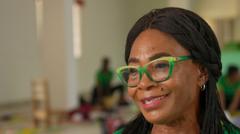In Nigeria, where misconceptions about disabilities persist, neonatal jaundice has emerged as a critical factor contributing to high rates of cerebral palsy. Babatunde Fashola, also known as Baba, is a poignant example; abandoned at birth, he now thrives under the care of the Cerebral Palsy Centre in Lagos, founded by Nonye Nweke a decade ago after her own experiences with her daughter Zimuzo.
Cerebral palsy is reportedly one of Nigeria's most prominent neurological disorders, with over 700,000 affected individuals. Neonatal jaundice, characterized by elevated bilirubin levels causing yellowing of the skin and eyes, complicates this issue since it impacts more than 60% of newborns in the country. While most cases are easily treatable with phototherapy, the lack of immediate access to such medical interventions can lead to long-term disabilities like cerebral palsy.
Prof. Chinyere Ezeaka, a pediatrician, warns that timely treatment is essential, or the consequences could be irreversible. Unfortunately, Nigeria is among the five countries worldwide with the highest rates of neurological disorders resulting from untreated jaundice, primarily due to insufficient medical infrastructure.
Nweke's personal journey motivated her to establish her center, where currently twelve children receive free care. The facility operates solely on donations, facing a backlog of over 100 applications for aid.
Nweke's commitment is unwavering, despite the toll it takes on her well-being. "Managing care is overwhelming and expensive," she reflects, explaining how societal rejection often accompanies having a child with a disability, as many families incorrectly believe such children are cursed or evil.
In response, the Oscar Project launched in Lagos, aiming to improve jaundice detection and treatment. Spearheaded by disability advocate Oscar Anderson, whose cerebral palsy was a result of untreated jaundice, the initiative seeks to equip health facilities with proper equipment and training to combat the issue.
Anderson's work in Nigeria aspires to mirror the success of similar projects in Vietnam, where comprehensive screening programs have protected thousands of infants from complications arising from neonatal jaundice. With the support of health workers, mothers, and donors, the ambition remains strong: every newborn must be screened to prevent future disabilities.
Despite the monumental hurdles, Nweke, Anderson, and other advocates persist in fighting for recognition, support, and treatment, ensuring that children affected by jaundice have a brighter future ahead.


















